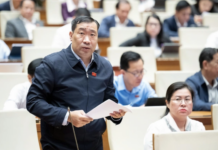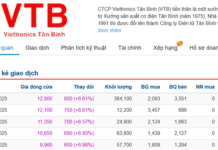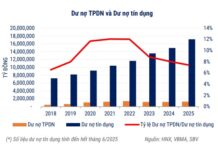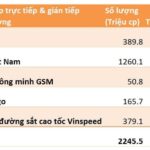LTS: Dr. Can Van Luc and the authors group from the Training and Research Institute of BIDV have just released a report assessing the quick impact of the amended Housing Law (2023) and making some recommendations. We would like to publish the original report for readers to follow.
————
Evaluation overview
On November 27, 2023, the National Assembly passed the amended Housing Law, which took effect from January 1, 2025. Accordingly, the amended Housing Law (Law No. 27/2023/QH15 dated November 27, 2023) consists of 13 chapters, 198 articles (keeping the number of chapters, but reducing 17 articles compared to the 2014 Housing Law); in which there are many new important points, institutionalizing the guiding principles and orientations of Resolution No. 18/NQ-TW dated June 16, 2022; at the same time ensuring coherence and consistency with the amended Real Estate Business Law (2023) and the amended Land Law (2024) (which were approved by the National Assembly).
This is an important project; it impacts many entities in the economy. The Housing Law, together with the amended Land Law and the amended Real Estate Business Law (which all take effect from January 1, 2025), is a major step towards improving the institutional framework, promoting the real estate market, and building a healthy, transparent, and sustainable real estate sector in Vietnam.
Nine (9) new points of the Housing Law in 2023 and their impact on individuals, businesses, and the economy
Firstly, standardizing regulations, scopes of application among the related Laws for many important issues such as: the ownership rights attached to land use rights of Vietnamese people residing abroad will be implemented according to the provisions of the Land Law 2024; the establishment of ownership rights of houses between investors and buyers will follow the Real Estate Business Law 2023; conditions for commercial housing project investors will be unified with the Land Law 2024, the Real Estate Business Law 2024…etc.
These are important new points, contributing to minimizing the overlapping situations, diverse interpretations each place, the execution authorities not knowing how to cause impacts on law enforcement as at present; thereby helping to reduce time, costs for business project implementation, increasing supply sources for people to have more choices with reasonable prices. With a completed financial organization, a well-established legal framework, it will support investment activities, loans, project transfer, and facilitate bad debt handling better. However, this positive impact depends much on the guidance and practical implementation afterward.
Secondly, clearer provisions on planning, housing development strategies. Based on the inheritance of the Housing Law in 2014, the amended Housing Law has dedicated 2 chapters (Chapter III and IV) to regulate the methods and basis for building housing development plans, strategies from the national to provincial levels; as well as regulations on housing development planning, orientation for the investment process of housing projects. At the same time, the amended Law has clarified the planning work towards meeting the requirements of housing development and not allowing any subdivision, land sale in special types of urban areas, type I, type II, and type III (Article 5).
This provision will contribute to raising the quality of planning work, ensuring a unified direction throughout the country, while the housing development strategy must be appropriate for each type of urban area; contributing to enhancing the effectiveness of planning work in practice, limiting drawbacks in project implementation. Along with that, the rampant subdivision and land sale will be controlled, limiting impacts on planning, social security of the area as well as reducing fraudulent cases where buyers are victims as in the past. However, functional agencies need to pay attention to connecting housing development planning with social housing development and land use planning.
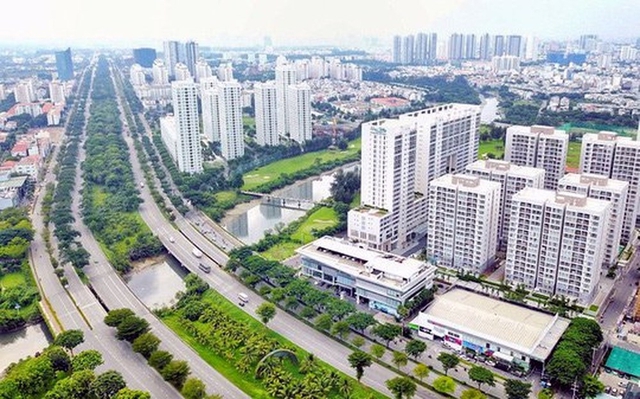
Thirdly, the 2023 Housing Law has supplemented, clarified some prohibited activities to limit violations, disputes, elements that cause insecurity (including fire prevention and fighting – PCCC) in the entire process of project development and operation, use of housing. The 2023 Housing Law has supplemented, clarified some prohibited activities (Article 3), noteworthy as: (i) mobilizing and using capital in the wrong purpose, wrong regulations; (ii) prohibit some business activities, in which business activities like bars, karaoke are added to the prohibited list compared to current regulations, prohibit business activities that do not comply with fire prevention and fighting requirements; (iii) using an apartment building for non-residential purposes; and (iv) not contributing to the maintenance of the common ownership part of the apartment building…etc. Thus, the inspection and supervision process are important along with the awareness of the people and the strengthening of the true role of the condominium administration board and propaganda for users.
Fourthly, on ownership, sale and mortgage of houses by foreign organizations and individuals: fundamentally, the 2023 Housing Law inherits the provisions of the 2014 Housing Law and has some noteworthy amendments. It is the regulations on the rights, obligations of ownership of houses for foreign individuals according to 2 cases: (i) In the case where foreigners marry Vietnamese citizens living in Vietnam, they will own houses and have the rights, obligations of house owners like Vietnamese citizens; (ii) In the case where foreigners marry Vietnamese persons residing abroad and are allowed to enter Vietnam, they will own houses and have the rights of house owners like Vietnamese people living abroad (Articles 20 and 21). The difference mainly lies in the ownership of houses attached to land use rights and is stipulated in the 2024 Land Law. Accordingly, Vietnamese-origin people living abroad are also the subjects of land use rights and enjoy relatively full rights like Vietnamese citizens (except for mortgage rights, which are limited to collateral at credit organizations operating in Vietnam). Another thing is,
This provision helps to harmonize with the 2024 Land Law, the 2023 Real Estate Business Law and creates conditions for Vietnamese-origin people, foreigners to be more attached to Vietnam, thus contributing to attracting remittances, foreign investment, improving the consumption of real estate products, ensuring the land management requirements, and national security. However, the ownership conditions of houses for foreigners are still quite general when only stipulating “Foreign individuals are allowed to enter Vietnam” (Article 17). Therefore, there needs to be more detailed guidance and regulations on some conditions for owning houses in Vietnam for foreigners (visa duration, work in Vietnam, etc.).
Fifthly, no provisions on ownership duration of apartments and additional incentives when implementing housing renovation projects. The 2023 Housing Law continues to inherit the old provisions regarding the period of apartment use (based on the quality of the construction and the inspection conclusion of the competent authority). Accordingly, this time the Law has devoted 1 chapter to regulate the issue of renovation, reconstruction, management, and use of apartment buildings (Chapter V), aiming to limit difficulties in relocation as at present; in which the noteworthy point is the addition of regulations exempting procedures for determining land price, calculating land use fees, land lease fees, and exempting procedures for requesting exemption from land use fees, land lease fees for investors implementing housing renovation projects (Article 63).
This content helps to solve disputes about the ownership duration of apartments and improve the effectiveness of housing renovation work, reduce procedures and costs to increase the ability to attract investors to renovate old apartments; thereby reducing the time to implement the project, increasing supply for the market, and benefiting people. However, it should be noted to inspect the quality of apartments and suitable conditions for renovating old apartments during implementation.
Sixthly, allowing the issuance of a certificate (GCN) if the mini-apartment meets the conditions specified by law. The 2023 Housing Law has added separate provisions for the development of mini-apartments (Article 57), in which: (i) allowing the issuance of GCN if it meets the conditions specified by law and the Government’s detailed instructions; (ii) requiring individuals who build mini-apartments to meet the conditions of being project owners, investment, and construction in accordance with the law on construction and other relevant regulations regarding the housing investment project.
This is a new content, creating conditions to promote both social security, social safety (people) and business aspect, when legitimizing the mini-apartment model (allowing the issuance of GCN) based on complying with the provisions of the law. However, the construction of mini-apartments should be more tightly controlled when individuals are required to meet the conditions of being project owners, and thereby limit the regrettable consequences as in the past. At the same time, it is necessary to pay attention to the transitional provisions regarding this issue.
Seventhly, clearer regulations regarding the development of social housing (SH), housing for workers in industrial zones (IZ). The 2023 Housing Law has supplemented and amended many important contents related to SH policies towards: (i) expanding the subjects invested in SH (including the Vietnam General Confederation of Labor, economically-based organizations with foreign investment, with certain restrictions); (ii) expanding the subjects entitled to SH policies (including businesses in industrial zones); (iii) supplementing preferred policies (without adopting procedures for exemption or reduction of land use fees, land lease fees; legislating the use of 20% of the land area of SH for investing in the construction of business services, commercial houses, and investors entitled to full profits for this area, separate accounting with construction costs of SH; the investor of SH projects does not have to allocate a minimum of 20% of the SH area in the project for lease)…etc; (iv) amending some contents inconsistent with reality (such as land fund: allowing cash payment instead of having to allocate land funds in commercial housing projects as at present; removing criteria for permanent and temporary residence registration; not specifically stipulating income conditions in the Law…).
The new contents related to SH are expected to have positive impacts on the SH market both in terms of supply and demand by diversifying investment resources, expanding the reasonable subjects for enjoying preferential policies, and supplementing practical preferential policies. However, it is necessary to focus on streamlining the procedures and implementation of SH projects, creating a long-term and sustainable ecosystem and development capital for SH.
Eighthly, detailed regulations on State management of housing. Recognizing the importance of the management and regulation roles of the State as well as the information system, data for the real estate market, the 2023 Housing Law has dedicated a chapter (Chapter XI) to regulate the role of the State in managing and regulating the real estate market; in which has added, clarified many contents regarding the role and responsibilities of related entities and the Government will guide them in detail in the future to ensure unified nationwide implementation. However, the Government needs to specifically stipulate the responsibilities of building, managing, and exploiting information, data on housing and allow pilot implementation some unresolved issues in the Law such as having the pilot policy of using “other land” for commercial housing to solve current difficulties.
Ninthly, specific provisions on transferring have been realized, contributing to resolving specific cases. The 2023 Housing Law stipulates 7 transfer contents, in which some noteworthy contents such as the transfer provisions for provincial housing development programs and plans approved before the effective date of this Law; transfer provisions for renovating, rebuilding, managing, using apartment buildings; transfer provisions for social housing development, etc.

Six (6) recommendations:
– Firstly, the Government should direct the early issuance of Decrees, Circulars guiding to ensure consistency and coherence among the Land Law, Housing Law, Real Estate Business Law amendments with other related laws (to overcome overlapping, difficulties, ensuring effectiveness of enforcement…); including paying attention to the transitional provisions. At the same time, focusing on building, issuing decrees on development of land information, real estate, which clearly stipulate the responsibilities, implementation methods, coordination in the provision, management, and exploitation of land information, real estate… by related organizations.
– Secondly, the development costs of real estate projects (especially housing) may increase when the Land Law, Housing Law, Real Estate Business Law amendments take effect from the beginning of 2025 due to land pricing being closer to market value; therefore, there needs to be specific solutions to regulate house prices such as promoting the development of SH, affordable housing, accelerating the project approval process to increase supply, being ready to intervene when the market shows signs of being “hot,” “speculative”…etc. Accordingly, the Government needs to pay attention to building the land, real estate information systems, in which to clearly stipulate the criteria for digitalization, green construction, green housing… in the construction and real estate fields.
– Thirdly, promptly issuing a pilot plan to allow commercial housing projects to be implemented through agreements on land use rights or other land use rights (not for residential use); the pilot implementation should be carried out in some provinces, major cities… to promptly resolve difficulties and obstacles for real estate projects (especially affordable housing, commercial housing projects).
– Fourthly, pay attention to the content related to digital transformation, application of information technology, greenification in the development, management, and use of land, housing suitable for current and new trends to ensure effective, feasible land management, and housing.
– Fifthly, actively promote the implementation of new policies, regulations on SH to enhance attracting resources for developing this segment, contributing to solving the shortage of affordable housing supply, contributing to the goal of the “Investment in constructing at least 1 million social housing apartments in the 2021-2030 phase.” Accordingly, a new SH development fund should be established (such as Singapore’s, South Korea’s model)… to ensure the sustainability, feasibility of the Program. According to the experience of Korea, this fund should be developed from the state budget. The capital for this fund can be mobilized from 5 sources as follows: (i) revenue from the 20% land fund for SH, (ii) capital contribution from domestic and foreign financial institutions; (iii) issuance of Government/local government bonds; (iv) corresponding capital, additional capital from domestic credit institutions; and (v) ODA capital, international financial institutions, and non-profit organizations.
– Finally, strengthen propaganda, dissemination of the laws that have been passed (especially the Land Law, Housing Law, Real Estate Business Law, the amended Laws of Credit Organizations…etc., especially new, noteworthy points and points that need clarification, need complete and detailed guidance) to people, organizations, and stakeholders to increase understanding, awareness, compliance, and contribute opinions on policies, enhance enforcement effectiveness in reality.










